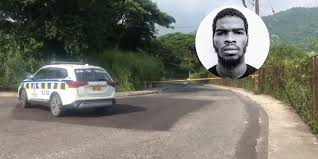On Monday of this week news broke that reputed gang leader Christopher
Linton, known otherwise as Dawg Paw had been shot and killed following a
confrontation with police. Linton who
had been tagged with multiple murder and shooting charges was in 2013 sentenced
to 15 years for gun possession and shooting with intent at the police. Six
years later, Linton and his co-accused were freed by the Court of Appeal as the
Justices found that the identification evidence was unreliable. It appeared
that once freed, Dawg-Paw returned to his old habits, resuming a reign of
terror within the Papine, Kintyre, and Elletson Flats communities.
Interestingly, Dawg-Paw had been moving in and amongst the up-town
“brown-skinned” Jamaican community for quite some time to the extent that he sired
a child with Leah Tavares- Finson in 2010. Such contact had more than provided him
with multiple opportunities for self-development and him being parent to a
child with the Tavares-Finsons offspring may have been the catalyst for the
volume of responses. It is little wonder then that the news of his death lit up
social media like a beacon with multiple apologists attempting to canonize him. For openers, Councillor for the Papine
Division in Eastern St Andrew, Venesha Phillips, stated in a Nationwide
interview that “the life of crime that was led by slain gangster Christopher
‘Dawg Paw’ Linton, highlights the need for better rehabilitation programs for
convicted criminals.”
The same media house heard views from founder of the Jamaica Environment Trust
(JET), Diana McCaulay who contended that the wider society failed Linton during
his formative years. According to McCaulay, she knew Linton as a promising
child in the 1990s when he was still a student at St Hugh’s Prep in St Andrew. “He
was a lovely young man with plenty potential, so I think the outcome is very
sad. You know, I can’t speak to the crimes he committed—I have no knowledge of
those—but as a youngster, he was lovely. I think we failed him; a long list of
us and I include myself in that, failed him,” she said.
Diane Jobson, the lawyer who represented reputed gangster Christopher ‘Dog Paw’
Linton from he was a teenager, is quoted in a Gleaner Repost report the “she
found him to be charismatic and a natural-born leader.” According to the
report, she said that it is “a pity that the society didn’t make good use of
those characteristics … rather than treat him like a fugitive from justice, or
a man that should be feared or gunned down like an animal.”
One commentator in giving his take on the saga wrote on his Facebook page that
the Dawg Paw saga requires a Case Study. Under the heading – “Becoming Dawg
Paw” he wrote on Thursday of this week “I would love to get an understanding of
'Dog Paw's' backstory from his childhood to up to two days ago when he died. I
want to know, not because I want to be voyeuristic, but to understand the
contributory factors leading to the formation of species of Jamaicans similar
to him.”
The fact is that there are myriads of studies that have already been conducted
and scholarly articles written and published by numerous social scientists and
other professionals in Jamaica about murderers and other members of Jamaica’s criminal
class. All this commentator needs to do is to perform an academic search.
It is difficult to argue against the fact that aspects of our social structure
help in breeding our criminal culture. For starters, our secondary school
system provides as central warehousing of candidates for the criminal class as
more than a half of the population of secondary school graduates depart schools
annually without a subject pass and with nowhere to go. That notwithstanding,
only a handful embraces any kind of criminal lifestyle. Dawg Paw’s story is no
different from that of scores of other Jamaicans who chose to walk the criminal
path including Vincent “Ivanhoe” Martin (1924–9 September 1948) and whose
exploits spawned the Perry Henzel cult classic film “The Harder They Come.”
Others in the lineup included Dennis “Copper” Barth (whose character was
central to my own written work “Top Rankings-A Chronicle of The Origins of
Jamaican Badness”), Claudius Massop, Anthony “Starkey” Tingle, among so many
others. Not only do we know these men became killers but owing to the research
work of the likes of Dr. Fred Hickling, Herbert Gayle, Geoffrey Walcott, and
many others, we already know what to do.
If the intention of the discourse surrounding “Dawg Paw’s” demise is to force
the powers that be into rescuing our youth from similar outcomes, then it is
one that is indeed welcome, and I hope the effort is taken all the way. If, however, the intent is merely to sanitize surviving
relationships for the supposedly well-heeled class, then we are all just common
hypocrites as no one speaks for the surviving family members of the victims of
this man’s alleged murderous rampage.





No comments:
Post a Comment